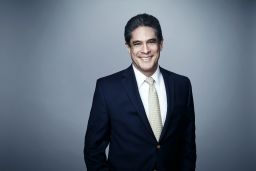Editor’s Note: Raul A. Reyes, an attorney and member of the USA Today board of contributors, writes frequently for CNN Opinion. Follow him on Twitter @RaulAReyes. The opinions expressed in this commentary are his.
Story highlights
Ben Carson, Ted Cruz, Marco Rubio took place in a town hall in South Carolina on Wednesday
Raul A. Reyes: Cruz combined elements of religious preaching and his experience as an attorney
Three’s a crowd. A trio of candidates for the Republican presidential nomination took their turns at CNN’s town hall in Greenville, South Carolina, but the truth is that tonight, at least, only one of them deserved to be there.
That would be Sen. Ted Cruz, R-Texas, who won the Iowa caucuses and is polling second in South Carolina’s primary that’s taking place Saturday.
Were this not such an extraordinarily volatile year in Republican presidential politics – thanks to Donald Trump – it is likely that both Sen. Marco Rubio and Dr. Ben Carson would have ended their campaigns by now. Instead they are lingering like self-absorbed actors who don’t know that it is past time to exit the stage.
But back to Wednesday night, and a major plus about this town hall is that we were able to see the candidates on their own – for better or for worse.

Carson should have done better with this format, without being interrupted or talked-over by his rivals. Yet he came across as a low-energy Sunday school teacher.
Asked to reconcile his opposition to government social welfare programs with the Christian imperative to take care of the poor, he rambled about how bad it was, starting in “sort of the 1920s”, that “for some strange reason” the government got involved in social welfare programs. Fact: The government got involved in social welfare programs because the Great Depression left millions of people without a job or even food. Was Carson not aware of this basic American history?
When another audience member asked Carson what his “Big Idea” for the country would be, he answered by noting that the U.S. population is dwarfed by that of China and India. But instead of actually offering a “Big Idea,” Carson stated: “We can’t afford to throw away any of our people.”
While that is a noble sentiment, it underscored the reality that just because someone is a brilliant surgeon, it doesn’t mean that he is intellectually ready to assume the presidency.
Rubio brought some welcome energy when he took the stage.
He was clearly prepared to make a good impression, to the point where at times he sounded like the reciter in chief. Unfortunately for the senator, his rapid-fire delivery sometimes undercut his own message; hyperspeed does not give viewers and listeners enough time to process ideas.
Policywise, Rubio’s message was a muddle.
Even while declaring that no one could get a good job without a college degree, he bragged about the vocational career training programs he created in Florida. He also touted his foreign policy experience, which ignores his penchant for missing Senate votes and his signing that shameful letter to the Iranian mullahs.
However, he did seem sincere when he mentioned being taunted as a child for being the son of Cuban immigrants. And he showed good political instincts when he said: “The American president has to love the American people, even those that don’t love you back – and that’s what I intend to do.”
This is the type of moderate language that could help win a general election – if he makes it past the primaries.
But Ted Cruz had the best night.
His presentation combined elements of religious preaching and his experience as an attorney, and it was certainly effective.
He spoke with confidence, even when making outrageously false statements (“We are one liberal Supreme Court Justice” away from the Supreme Court ordering “veterans’ memorials to be torn down.”) To the many undecided voters in South Carolina, Cruz no doubt projected strength and a command of the issues. So much so that nobody mentioned how his shutting down the government cost the country an estimated $24 billion.
Cruz gave a good explanation of why, despite being born in Canada, he is still eligible to run for president (although it should be noted that this is, of course, his own interpretation of the Constitution, and one not shared by all legal scholars).
And Cruz went unchallenged when, discussing the possibility of President Barack Obama nominating a Supreme Court justice to replace Antonin Scalia, he referred to Obama being in a “lame duck period.”
For the record, the “lame-duck period” is the time between the presidential election and the end of the sitting president’s term. It is telling that, for all his proclaimed devotion to the Constitution, Cruz would prefer that Obama not exercise his sworn constitutional duty.
Whatever the reason for the groupings, tonight’s line-up of Carson, Cruz and Rubio gave the town hall the appearance of “diversity night.”
The African American, Cuban-American and Canadian-Cuban-American candidates faced voters tonight, while the three Caucasian hopefuls will meet up on Thursday. Optics matter.
But there were two things that were a little odd given South Carolina’s significant number of veterans and military families.
Not one audience member asked the candidates about their collective lack of military service. And in a state that is 28% African-American, well, let’s just say that that didn’t appear to be reflected in this Republican audience.
